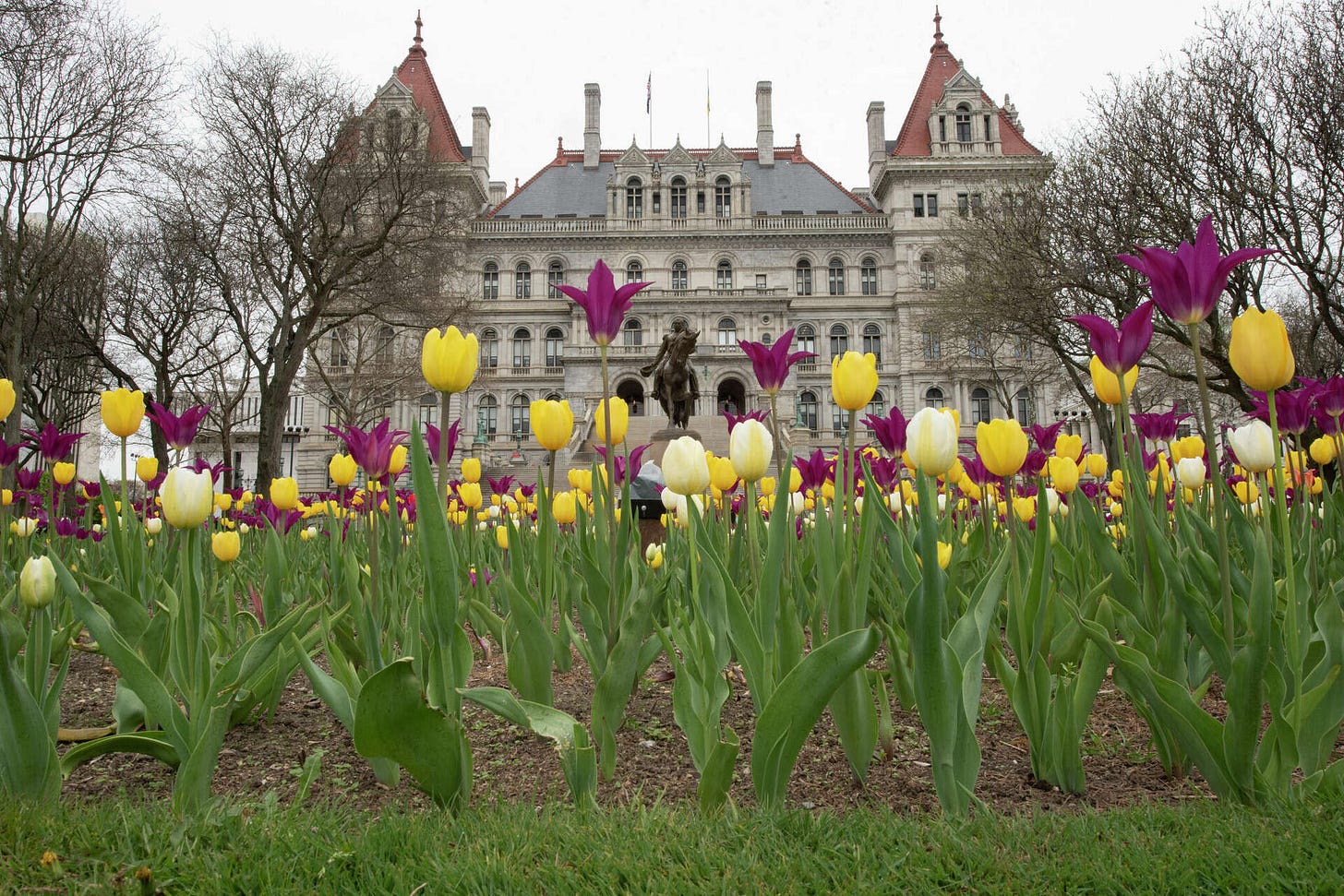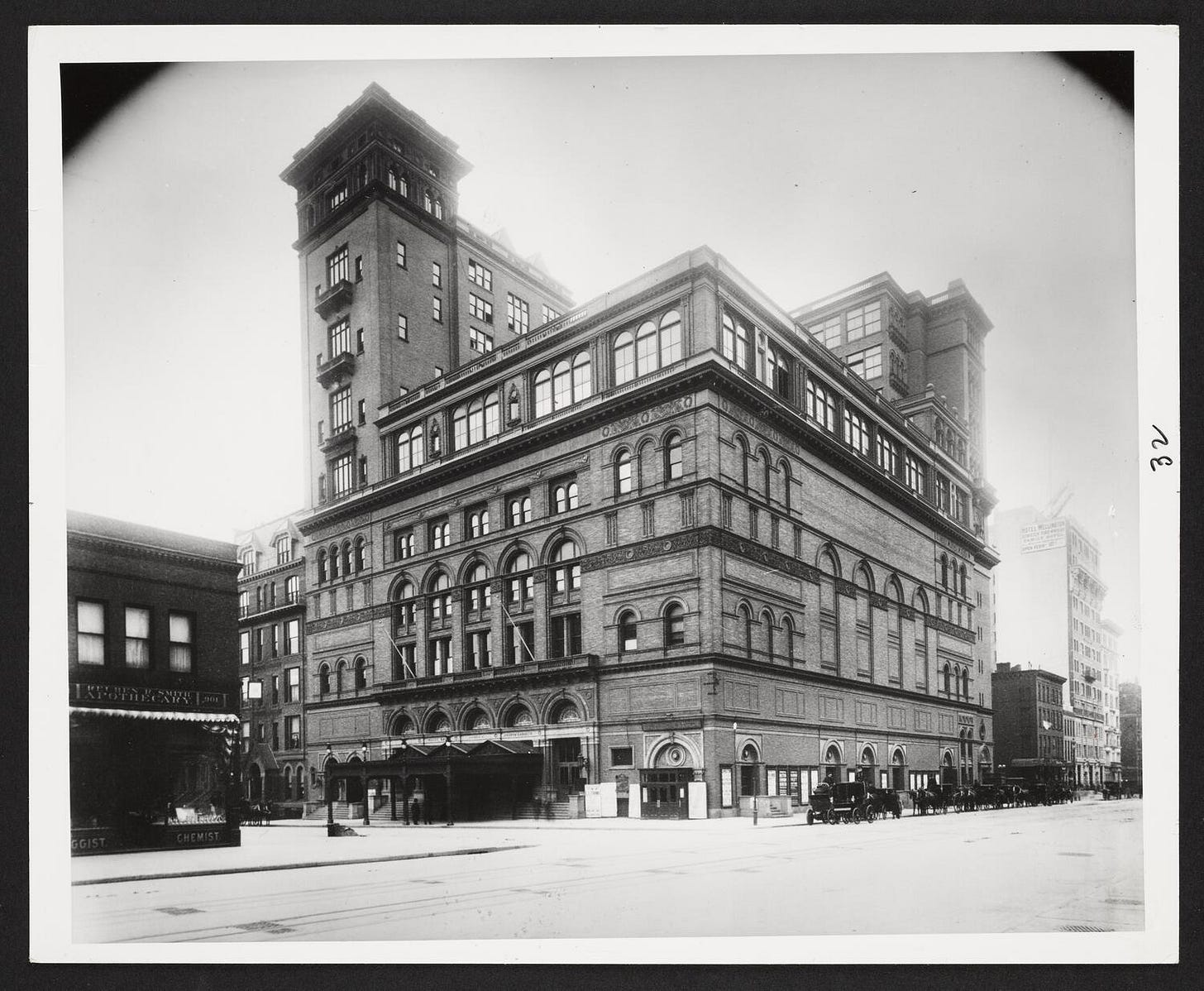Why N.Y.'s prosecutor watchdog panel still isn't operational six years later
Plus: Stefanik's challenge to early mail-in voting is heard by an appellate court, and This Week in New York History
Good afternoon — it’s Monday, and National Zipper Day.
MONDAY, APRIL 29, 2024
TODAY’S CAPCON:
A bill creating the Commission on Prosecutorial Conduct passed in 2018. So why hasn’t it done anything since?
A challenge to a law passed last year to allow mail-in voting is heard by an appellate court in Albany
This Week in New York History
🔨 Is Tomorrow a Session Day? No.
☁️ Tonight’s Weather: Albany: Chance of thunderstorms, rain, low 50s. New York City: Chance of rain, high 50s. (National Weather Service)
⚖️ N.Y.’s prosecutor watchdog panel inching closer to operational
🔎 After a video showed Monroe County District Attorney acting combative with a police officer who stopped her for speeding, the matter has been referred to a state commission.
You might have read Monday that Gov. Kathy HOCHUL has referred an incident between Monroe County District Attorney Sandra DOORLEY, a Republican (and former Democrat), and a police officer to the state Commission on Prosecutorial Conduct.
Media outlets in Rochester obtained footage of an interaction between a police officer and Doorley late Friday.
Doorley had allegedly been speeding — 55 mph in a 35 mph zone — and was pulled over. She told the officer to let it go because she was the district attorney.
She issued an apology Monday.
There’s just one problem: that commission still isn’t operational, has held only one meeting — entirely in executive session — and doesn’t have rules in place for how they’ll process complaints.
That’s partly because the commission has faced hurdles and roadblocks since the bill to create it was approved by the Legislature in 2018.
It was sponsored in the state Senate by former Sen. John DEFRANCISCO, a Republican who retired from the Legislature at the end of that year.
Republicans controlled the Senate at the time and gave DeFrancisco enough votes to pass the bill, even though several Republicans were against it.
But that didn’t work out.
The District Attorneys Association of the State of New York — then led by Albany County District Attorney David SOARES — sued to overturn the law, arguing it was unconstitutional.
They asserted in the lawsuit that the commission would impede the work of prosecutors around the state and had too much power.
They also argued it gave the judicial branch of state government more power over the commission’s work than the other two branches.
The district attorneys association and Soares won that case two years later when a state court judge decided the law creating the commission was unconstitutional as written.
The law also gave powers to the presiding justices of the state’s appellate courts, which the judge said exceeded their constitutional authority.
Assembly Speaker Carl E. HEASTIE, a target of the lawsuit, first sought an appeal of that decision.
✋ But lawmakers decided instead to pass a law stripping the parts of the commission the judge had declared as unconstitutional.
That passed in 2021 at the end of the legislative session, but there was no fanfare for the bill.
That way, lawmakers argued, the commission could get on with its work, even if it didn’t have as much teeth as Democrats in the Legislature wanted.
The new law took effect immediately, but the commission was not formed in 2021.
The chief judge at the time announced her three appointments to the commission in December of that year.
It was crickets in 2022 — nothing at all happened with the commission, despite being given $1.75 million in that year’s state budget.
The commission received the same amount in the 2023 and 2024 state budgets.
It wasn’t until 2023 that a position was even posted by the state seeking an administrator for the commission — you know, the person who would run the day-to-day operations.
The hiring of that person, Susan Friedman, wasn’t announced by the commission until two months ago, about nine months after the position was posted.
📜 But after more than two years of stagnation, the commission is moving toward the start of its work, a proposed regulation shows.
That regulation was published in last week’s edition of the State Register, which rounds up all of the proposed agency regulations each week.
The proposed regulation would essentially codify the commission’s functions and powers as they’re described in the law that created it.
No hearings are scheduled on the regulation, but public comment is accepted for 60 days after it was published.
I reached out to Michael A. Simons, the chair of the commission and dean of St. John’s University School of Law, to ask if he had a sense of when the commission would begin operating. He did not respond.
☑️ Early voting law challenged by Stefanik in hands of appellate court
🧑⚖️ Justices of the court heard arguments Monday in the case, which targets an early voting law passed by the Legislature in 2023.
If you were around at the end of last year’s legislative session you might remember the Early Mail Voter Act, a law that allows New Yorkers to vote by mail before Election Day.
It didn’t take effect until January of this year, so it wasn’t active during last year’s elections.
Rep. Elise STEFANIK sued to strike down the law the day after it was signed by Hochul.
Her attorneys have argued the state constitution usurps the law.
The constitution only includes two excuses for absentee voting: if someone’s ill or can’t be at the polls on Election Day.
And this is, sort of, the second part of the story on this conflict. The first part started in 2021.
That’s when voters rejected a proposed amendment to the state constitution that would have allowed no-excuse absentee voting, meaning you wouldn’t have to have a reason to vote by mail.
Democrats, at the time, attributed the rejection to a failure to reach voters on the issue.
So when the Legislature last year passed a law that allows voters to cast their ballot early by mail, Stefanik was ready to challenge it.
This is where it gets a little wonky, but stay with me.
Voters in New York are allowed to vote absentee because of section 2 of Article II of the state constitution.
That’s a paragraph that explains when voting by absentee is allowed.
But, importantly, it does not address mail-in voting, which Democrats in the Legislature view as different from absentee voting.
To boil all that down, here’s what both sides have argued:
Stefanik has argued that because mail-in voting isn’t prescribed by the state constitution the Legislature is not allowed to create such a system.
Democrats in the Legislature have argued that the absence of mail-in voting doesn’t mean they can’t create it. They see it as building on the state’s 2019 early voting law.
⚖️ About three months ago, a trial court justice in Albany County ruled against Stefanik.
That was Justice Christina Ryba, who sided with the Legislature’s argument about section 2 of Article II of the state constitution.
“It in no way limits the Legislature's inherent plenary power or its constitutional authority to enact laws that generally provide for voting methods other than by ballot,” she wrote.
Stefanik appealed that decision, which brings us to Monday, when attorneys on both sides of the case presented their argument to the Appellate Division, Third Department in Albany.
Michael Hawrylchak, the attorney representing Stefanik, argued that Ryba’s decision should be overturned because, in his opinion, she didn’t interpret the constitution correctly.
“The legislature does have a broad authority to regulate the manner of the method, the various things about elections, but that's always within the confines of what the constitution permits,” he said.
Jeffrey Lang, representing the state from the attorney general’s office, argued that the Legislature has passed different absentee voting laws in years past — like allowances for domestic violence victims — and that they have the same power to enact mail-in voting.
Lang said an amendment to the constitution approved in 1966 undid a prohibition on legislative authority in that area.
“We had a prohibition and the constitutional amendments allowing for absentee voting were exceptions to that prohibition,” he said.
Two of the court’s justices — Presiding Justice Elizabeth Garry and Associate Justice Michael Lynch — were particularly engaged with the arguments.
They questioned Hawrylchak’s position on the constitution regularly throughout the hour-long arguments. That’s much longer than the court usually allows.
“It’s just in my mind it’s an underlying important question not relevant to constitutional interpretation but in terms of the big picture here,” Garry said.
A decision from the court won’t come immediately, but could be released in the coming weeks.
📖 THIS WEEK IN NEW YORK HISTORY: Every Monday, we’ll plan to tell you about part of New York’s history from years past. This research is from New York State Historian Devin Lander and the New York State Museum, so you know it’s legit.
🏙️ May 1, 1931: There are few things more iconic in New York City than the Empire State Building. It was originally planned as an 80-story building, but 16 additional floors and a mast were added to make it the tallest building in the city. This is the day the building opened.
The final rivet on the building was installed by Gov. Al Smith. The building was constructed by 3,500 workers, many of them immigrants.
It was built on the site of the Waldorf-Astoria Hotel and financed by a group of wealthy investors who snatched up the property when another project failed.
⚾ May 3, 1936: And there are few names as iconic in baseball than Joe DiMaggio. Today was the day he had his debut with the Yankees. He set a record for rookies that year with 29 homeruns in 138 games.
He was in Major League Baseball for 13 years and played for the Yankees during all of them. He played in nine World Series.
His record for homeruns lasted 80 years until Aaron Judge made 52 homeruns in 2017.
🎵 May 5, 1891: This was the day Carnegie Music Hall opened in New York City. It was funded by industrialist Andrew Carnegie, who also served on the boards for the Oratorio Society and the New York Symphony Society.
The opening day event featured Pyotr Ilyich Tchaikovsky as a guest conductor. He called the hall “impressive and grand.”
Construction of the hall only took two years. It was originally intended to be a shared venue between the Oratorio and Symphony Societies.
📃 Death Certificates: A9896 ZACCARO: Would remove any fees or charges for obtaining a certificate of stillbirth or fetal death. Right now, the state charges $30 for those documents and New York City charges $15.
🚔 Domestic Violence: A9892 WALLACE: Would require law enforcement officers to conduct a lethality assessment in incidents of domestic violence. That would be a series of prepared questions for the victim to assess the extent of their abuse. (New Assembly sponsor)
🏠 Property Taxes: A9948 EACHUS: Would provide a property tax exemption for people with disabilities who have their primary residence in a special needs trust. Property owners who have a tenant with a disability would also be eligible. (New Assembly sponsor)
The Times Union Bill Tracker: Your guide to key bills on the table in this year’s legislative session, compiled by the TU’s Capitol Bureau. Find it here.
🔨 Is Tomorrow a Session Day? No.
There are no hearings scheduled at the Capitol tomorrow.
🤐 National Zipper Day: As I’ve told you before, sometimes these days are a bit of a stretch. But it was either this today or National Shrimp Scampi Day, and that seemed just as silly. So, zippers it is.
The first iteration of the zipper was in 1851, when Elias Howe invented the “automatic continuous clothing closure.” Whitcomb Judson filed a patent in 1893 for what’s closer to today’s zippers.
I don’t know if there’s much else to say about zippers. But imagine all the buttons that held clothes together before zippers. That’s a lot of buttoning.
More from the Times Union (Free for CapCon Subscribers):
Federal ticket-bot law that was to curb scalping rarely enforced
Federal ruling bans non-compete clauses for most workers but rule is challenged










